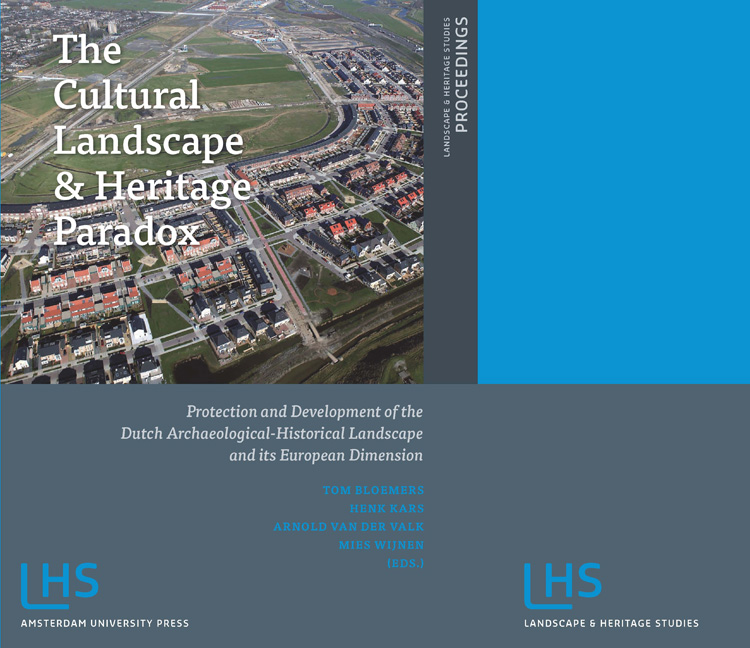 The Cultural Landscape and Heritage Paradox
The Cultural Landscape and Heritage Paradox Book contents
- Frontmatter
- Contents
- Preface
- I INTRODUCTION
- II INSIGHTS AND PROSPECTS OF ARCHAEOLOGICAL-HISTORICAL LANDSCAPE STUDIES
- III LINKING KNOWLEDGE AND ACTION
- IV IMAGINATION - FACTS AND CONSTRUCTIONS
- V SHARING KNOWLEDGE - STORIES, MAPS AND DESIGN
- VI SYNTHESIS AND CONCLUSIONS
- VII MANAGEMENT OF KNOWLEDGE
- VIII AGENDA FOR THE FUTURE
- IX SUMMARY
- X APPENDIX
- Subject Index
- Index of Places and Regions
11 - My Story – your Story: three levels for Reflecting and Debating the Relationship between Contemporary Archaeological Heritage Management and the Public. A Comment from Germany
Published online by Cambridge University Press: 21 January 2021
- Frontmatter
- Contents
- Preface
- I INTRODUCTION
- II INSIGHTS AND PROSPECTS OF ARCHAEOLOGICAL-HISTORICAL LANDSCAPE STUDIES
- III LINKING KNOWLEDGE AND ACTION
- IV IMAGINATION - FACTS AND CONSTRUCTIONS
- V SHARING KNOWLEDGE - STORIES, MAPS AND DESIGN
- VI SYNTHESIS AND CONCLUSIONS
- VII MANAGEMENT OF KNOWLEDGE
- VIII AGENDA FOR THE FUTURE
- IX SUMMARY
- X APPENDIX
- Subject Index
- Index of Places and Regions
Summary
ABSTRACT
The existing German and to some extent European archaeological heritage protection agencies are, as far as their routine work is concerned, torn between the demands of academic research and their mandate as administrative bodies. The preference tends towards academic research. In this article I wish to examine two main questions. Firstly, who benefits from archaeological heritage management, i.e. who is it done for? Secondly, what is the social purpose of archaeological heritage management? When tackling these questions we must keep three important factors in mind, namely the current demographic changes, the increasing mobility of modern societies and the accelerating changes that are taking place both in world economics and land-use structures.
KEY WORDS
Archaeological heritage management, public involvement, cultural heritage, regional planning, potential aims
INTRODUCTION
It is now almost three decades since archaeological research in Germany and its administrative arm, archaeological heritage management, began to become aware of the social effects of their work. Towards the end of the 1980s there was increasing interest in the political misuse of archaeology in the Third Reich. This issue made both academic and administrative archaeological circles conscious of the problem of reactivity.
In sociology this term is used to describe the interference of society and science which, in fact, opened up a new field of research for archaeology. This step in the direction of a discipline dealing with the sociology of science not only opens up completely new perspectives for archaeological interpretation, it also permits a distinction to be made between social and scientific interpretation patterns or modes. It also represents the first step in a new form of enquiry about the content of our own discipline, which of course also bears on the influence of archaeological research work on the contemporary social environment. In this sense, the contemplation of the social dimension of archaeology permits a completely new view of the evolution of archaeology itself. This now involves both aspects of research history and also its effect on mentality development and co-related problems of the ethics of science (Ickerodt 2004).
These must be taken into consideration when one is faced with the questions ‘For whom is archaeological heritage management undertaken?’ and ‘What are the social aims of archaeological heritage management?’
- Type
- Chapter
- Information
- The Cultural Landscape and Heritage ParadoxProtection and Development of the Dutch Archaeological-Historical Landscape and its European Dimension, pp. 351 - 362Publisher: Amsterdam University PressPrint publication year: 2010
- 1
- Cited by


